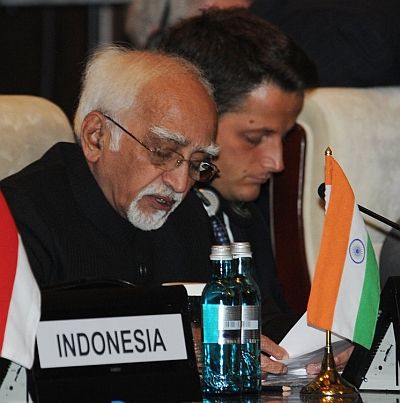 India on Friday pressed the international community to work together to erase the scourge of terrorism by taking speedy action against the perpetrators, organisers, financiers and sponsors of terrorism in the wake of a deadly truck attack in France that killed 84 people.
India on Friday pressed the international community to work together to erase the scourge of terrorism by taking speedy action against the perpetrators, organisers, financiers and sponsors of terrorism in the wake of a deadly truck attack in France that killed 84 people.
Addressing the plenary session of the 11th Asia-Europe Meeting Summit here in the Mongolian capital, Vice President Hamid Ansari said, "all our societies today face unprecedented levels of threat from terrorism in all its manifestations. The most recent example is what has happened, most unfortunately in France."
"We need to cooperate meaningfully to deal with this threat. Let us pledge today to work together to erase the scourge of terrorism by taking speedy action against the perpetrators, organisers, financiers and sponsors of terror," Ansari said.
Earlier in the day, a truck ploughed into a crowd in the French city of Nice, killing 84 people in what President Francois Hollande called a "terrorist" attack on revellers watching a Bastille Day fireworks display.
The ASEM summit, attended by a number of European leaders, including German Chancellor Angela Merkel and European Council Donald Tusk, observed a minute of silence to mourn the death of innocent people in the French city.
Ansari said the "early adoption of the Comprehensive Convention on International Terrorism under the aegis of the UN is an imperative today. I urge ASEM support for it." The Vice President also called for collaboration to protect "our global commons such as the seas and oceans in accordance with international conventions".
"Let us resolve disputes peacefully, without threats or use of force, and exercise self restraint in the conduct of activities that could escalate disputes effecting peace and stability. As a State Party to the UNCLOS, India urges all parties to show utmost respect for the UNCLOS, which establishes the international legal order of the seas and oceans," Ansari said, days after a UN-backed tribunal struck down China's claims of "historical rights" in the disputed South China Sea on a case brought by the Philippines.
Besides the Philippines, Vietnam, Malaysia, Brunei and Taiwan challenged China's claims.
Among those present at the summit was Chinese Premier Li Keqiang.
The vice president noted that the ASEM today marks two decades of multilateralism between Asia and Europe.
"ASEM today is a dynamic bridge between Asia and Europe. Our shared endeavour has been to promote multi-dimensional connectivity between our continents. The theme of ASEM 11, '20 Years of ASEM: Partnership for the Future through Connectivity,' is, therefore, pertinent," Ansari said.
He noted that connectivity is an enabler -- for development, for improving the quality of life of people, for encouraging greater people-to-people exchanges, for stimulating trade and investments, and indeed for building peace, stability and security.
"Physical connectivity is merely the means to meeting the aspirations of our citizens; to building mutually beneficial partnerships, and to collectively addressing our regional and global challenges. The networks of connectivity that we build must be all-encompassing -- not merely physical. It must also include institutional, digital, economic and socio-cultural aspects," he said.
Ansari said all countries should work to facilitate trade and commerce, and build integrated production networks and value chains for mutually beneficial development.
"Let us create energy alliances, such as the International Solar Alliance of solar rich countries, to enable energy security for all. Let us build networks of partnership between our business communities as also among our universities, cultural and civil society organisations. Above all, let us create connections of the heart and mind, to make ASEM a shared space of peace and harmony," Ansari said.
"For us in ASEM, democracy and liberal human values is an important ingredient. Our host, Mongolia, is a recent and successful example of the democratic experience and we congratulate them on their success," he said.
The Vice President said that as ASEM steps into the third decade, it is incumbent upon us to ensure that ASEM remains a responsible and positive forum.
ASEM must not only shape the global agenda but also move towards concrete action. A start, in this direction, was made at the New Delhi Foreign Ministers Meeting in November 2013. India will continue to be a constructive partner in this endeavour, he said.
"As we look ahead, ASEM's inherent strengths -- in the diversity of its membership, the complementarity of its capacities, the strength of its political leadership and robustness of its economies, must reflect in its ambition for the third decade," he said.
Ansari said that he was confident that together all members of the ASEM will elevate the group’s role to harness the collective capabilities of the two dynamic continents -- Asia and Europe -- for the shared peace, progress and prosperity of our countries and regions.
ASEM comprises of 53 entities -- 51 countries from Asia and Europe and two regional bodies -- the European Union and the ASEAN Secretariat. It represents around 62.3 per cent of the world's population, 57.2 per cent of the global GDP and almost 60 per cent of the world's trade.










